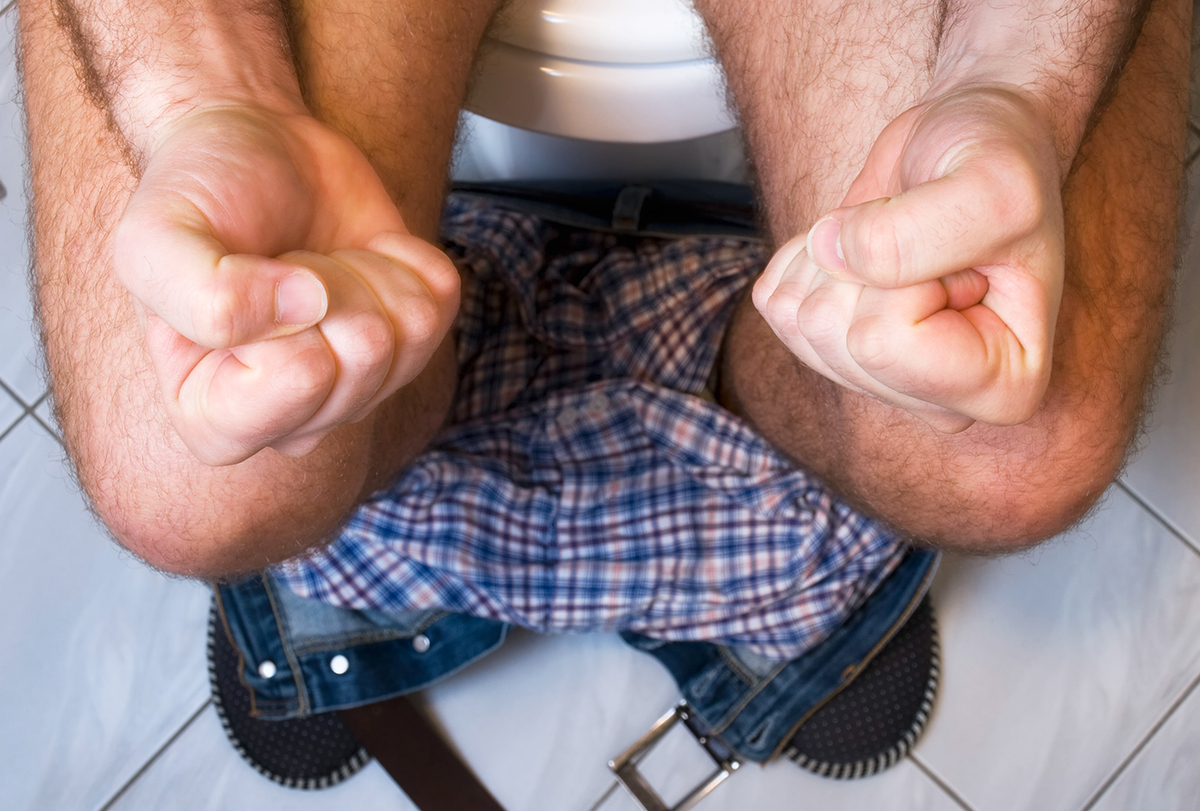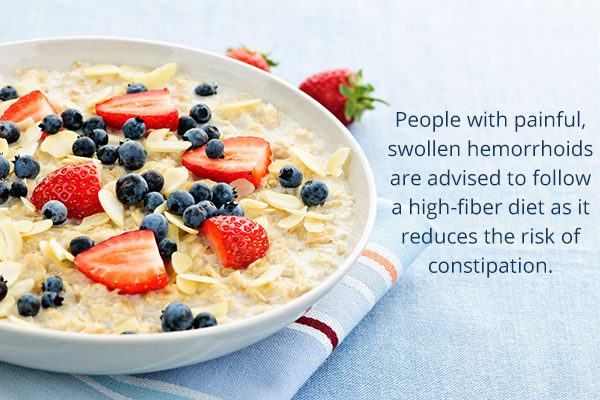In this article:
Hemorrhoids are part of the normal anatomy, which means everybody has them. They are tissues in and around the anus and lower rectum that contain blood vessels, also called hemorrhoid veins.

It is when these veins or blood vessels become inflamed or irritated due to the extra pressure exerted on them that hemorrhoids become a cause of discomfort.
The problem of painful hemorrhoids commonly affects both men and women and nearly 4.4% of the entire American population suffers from it. (1)
Different Types of Hemorrhoids
Hemorrhoids are broadly categorized into two types, internal and external.
Internal hemorrhoids are located deep inside the anus, whereas external ones are fairly superficial and can be felt under the skin around the anal opening.
Internal hemorrhoids present in the anal canal can be symptomatic without prolapsing. In their normal state (not swollen or bleeding), hemorrhoids aid in stool control and are called anal cushions.
Anatomically, internal hemorrhoids have three anal cushions, which are located in the right anterior, right posterior, and left lateral areas within the anal canal.
Painful hemorrhoids have four different grades:
- Grade I is always internal.
- Grade II prolapses during defecation but self-reduces.
- Grade III requires manual reduction.
- Grade IV cannot be reduced and has both internal and external components.
Causes of Hemorrhoids

Factors thought to cause symptomatic hemorrhoids include straining, constipation, diarrhea, pregnancy, irregular bowel patterns, aging, and upright posture. There is a genetic component to hemorrhoids as well, which means you are likely to get them if your parents had them.
Common Symptoms of Hemorrhoids
Common symptoms of hemorrhoids include:
- Bleeding during bowel movements
- Protruding lumps
- Itching around the anal area
- Discomfort
- Pain
- Problems with hygiene
- Burning sensation
When internal hemorrhoids are the primary source of the problem, the main symptoms are generally rectal bleeding and prolapse (bulging outside the anus). Pain is very rarely associated with internal hemorrhoids.
The rectal bleeding that occurs with internal hemorrhoids is usually bright red with a frequency ranging from rarely to several times per day. It can be seen on the toilet paper and/or in the toilet water. Typically, the frequency and severity will increase over time.
External hemorrhoids, on the other hand, are more likely to be associated with pain, especially when they are engorged or inflamed. Thrombosis is another way hemorrhoids can cause significant pain. In this condition, blood clots form in the hemorrhoids, impeding blood flow and causing a sudden onset of pain and swelling.
It is important to keep in mind that anorectal symptoms can be associated with a wide variety of diseases. Therefore, it is important to get checked by a specialist for a proper diagnosis.
Treatment for Painful Hemorrhoids
Treating hemorrhoid pain typically involves the following steps:
- Painful hemorrhoids should first be managed at home through doctor-recommended dietary changes.
- If dietary interventions fail to provide relief, you may have to undergo certain clinical procedures such as rubber band ligation, injection sclerosis, and infrared coagulation. These procedures are performed in the outpatient setting (usually office based) without the use of anesthesia, and you can return to your regular diet and normal level of activity shortly after the procedure.
- Only large symptomatic hemorrhoids that failed office treatment will require surgical intervention, most commonly excisional hemorrhoidectomy. This procedure is associated with excellent results, minimal recurrence rates, and low complication risk but significant postoperative pain. Incarcerated or strangulated hemorrhoids require immediate attention and operative surgery.
Home Remedies for Hemorrhoids

The most common problem associated with a hemorrhoidal disease is irregular bowel patterns. Thus, the best remedies to treat hemorrhoid flare-ups are geared toward minimizing constipation.
- A high-fiber diet is effective against constipation. The recommended daily dose of dietary fiber is 25 g for women and 38 g for men per day. (2) Unfortunately, this amount of fiber is difficult to reach with the regular American diet, which contains only 16 g of fiber per day.
- Stool softeners and fiber supplements may be necessary, especially if constipation is present. Along with the increased fiber, you should also drink at least 64 ounces of water per day.
- Sitting in a bath (soaking in warm water) for 10–20 minutes can provide immediate relief from acute flare-ups.
- Over-the-counter creams and suppositories can provide some relief but do not treat the condition.
Complications of Untreated Hemorrhoids
Complications of untreated hemorrhoids include:
- Persistent rectal bleeding: This can cause excessive blood loss and anemia.
- Incarceration: The hemorrhoids become trapped upon exiting the anus, causing blood clot formation.
- Strangulation: The anal muscles block the blood supply to an internal hemorrhoid that has protruded through the anal opening.
Seek immediate medical help as these conditions may require emergency surgery.
Most-Asked Questions About Hemorrhoids
Are hemorrhoids dangerous?
Hemorrhoids are not dangerous. However, other conditions, such as cancer and colitis, that can cause similar symptoms need to be ruled out. If untreated, they can sometimes cause anemia due to excessive blood loss. This is why it is important to get checked by a specialist.
How long do hemorrhoids last?
The symptoms of external hemorrhoids usually resolve within 7–10 days, and the firm lump should recede within 4–6 weeks. However, internal hemorrhoids may sometimes warrant special treatment.
Do hemorrhoids smell?
Generally, they are not associated with a smell unless they become gangrenous, necrotic, or prolapsed. Bad odor is due to soiling from hemorrhoids that prolapse and contaminate the surrounding skin.
Can stress cause hemorrhoids?
Stress is generally not a direct cause of hemorrhoids. Stress can induce irritable bowel disease, which results in irregular bowel habits and may cause hemorrhoid flare-ups.
Are hemorrhoids genetic?
Hemorrhoids can be genetically transmitted from one generation to another.
What are the major causes of hemorrhoid flare-ups?
Irregular bowel patterns, especially constipation, straining, diarrhea, and pregnancy can cause hemorrhoid flare-ups.
Medical conditions that cause irregular bowel patterns (such as colitis, inflammatory bowel disease, and irritable bowel syndrome) or increased pelvic pressure can also cause hemorrhoids flare-ups.
Is it okay to pop hemorrhoids?
For thrombosed external hemorrhoids, excision can be performed under local anesthesia in the office setting by a specialist or in urgent care. Excision allows the hemorrhoids to resolve faster. The excision is generally performed within the first 7–10 days of its occurrence.
Final Word
Hemorrhoid symptoms need to be evaluated by a physician who is trained in treating diseases of the colon and rectum.
Although common, hemorrhoids should not be taken lightly, and you must seek professional medical help for proper treatment. This is especially important since what may seem like a hemorrhoid flare-up may actually be a sign of something more serious.
Self-treating the condition with over-the-counter medications or other measures without any certainty about the underlying cause can be dangerous.
- Was this article helpful?
- YES, THANKS!NOT REALLY


